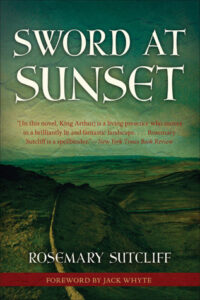 Sword at Sunset, Rosemary Sutcliff
Sword at Sunset, Rosemary Sutcliff
Originally posted 24th February, 2011
I didn’t think I was going to like Sword at Sunset as much as I typically like Rosemary Sutcliff’s books, even though it was surely combining two of my favourite things — Sutcliff’s writing and realism, and Arthurian myth. It began slowly, I think, and it was a surprising change of tone for Sutcliff — her books are mainly written for children (of any age!), but this book had decidedly adult themes, with the incest and more explicit references to sexuality than I’d expected. It’s also unusual for her in that it’s written in first person, and narrated by Arthur himself.
It also, to my surprise, had a couple of LGBT themes — a gay couple among Arthur’s men, to begin with, and then the relationship between himself and Bedwyr. There’s no Lancelot here, and Bedwyr takes that place in many ways, but with more of a shown relationship than I’ve ever found typical between Arthur and Lancelot. It brought tears to my eyes several times, especially this moment: “I could have cried out to him, as Jonathan to David, by the forbidden love names that are not used between men; I could have flung my arms around his shoulders.”
There’s nothing explicit about them, at all, but their bond has a profoundness about it, even after hurt and betrayal, that defies easy categorisation.
The relationship between Arthur and Guinevere is also an interesting one, and again one that makes no shortcuts using the existing myth, but builds up something believable alone. His relationship with her, the odd barriers between them, and the attempts to reach each other, and their love that isn’t quite enough to bridge that gap… It’s all believable.
The whole book takes some pains to be believable, emotionally, and historically. The themes, characters, etc, all seem to have some explanations for how the story could develop later… Bedwyr somewhat in the place that Lancelot takes later, Medraut almost exactly as he will be later, the moment in which Arthur realises how the badge he chooses for battle will be translated into that text which talks about him carrying the image of the Virgin Mary… And they’re all aware of how the stories will be magnified, too. It’s an interesting way to put it.
Oh, and I forgot to mention it when I first wrote this review, but I was fascinated by Gwalchmai, despite his relatively minor role. It’s odd: he isn’t related to Arthur (one of the constants of the Arthurian tradition more generally), and though he is a fighter, his main role is that of surgeon. He’s also disabled. I don’t think I’ve seen a portrayal of Gawain/Gwalchmai quite like this anywhere else.
It took me a while to get into Sword at Sunset, but it was worth trusting Rosemary Sutcliff and going with it.

I must re-read this as one of my favourites. I thought the scene of the wedding night between Arthur and Gwenhumera (or however RS spelt it) was very touching and tragic, particularly when she kisses him and says, ‘Then God help us both, my dear,’ (haven’t read it in years, so I’m paraphrasing) instead of, as he thought, turning away in disgust. And then the next morning, with his sudden realisation that he loves her when one of his men makes some remark that arouses his sudden jealousy, was wholly believable.
Rosemary Sutcliff does an amazing job with those quiet, tender, unexpected moments, I think. She has a light touch that avoids it getting too melodramatic or sickly.
For me too it’s been a long time since I read this — decades now — and yet your review exactly captures my memories of it. I’m not sure why I’m reluctant to reread it — probably the arc of inevitable tragedy that runs through it continues to run counter to my determination to be positive in the face of so much depressing world news. Some time the moment willbe right, I’m sure, as it’s the best of the historical fiction treatments of the Arthurian story I’ve yet read.
Chris Lovegrove recently posted…“Rook, read from your book”
Yes, she does a great job with that sense of inevitable tragedy — making you hope, but knowing there’s no real chance, and… yeah. I wouldn’t want to read it at the moment either, I think.